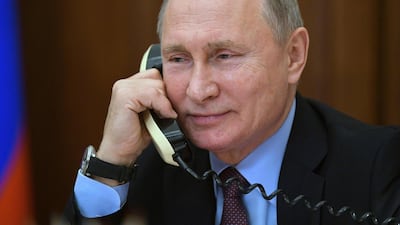The decision of President Donald Trump to withdraw American forces from Syria has accelerated the arrival of a new moment in the Middle East, one characterised by firm US disengagement and a larger Russian role in the region.
In the decades after the 1970s and the end of the presidency of George W Bush, Washington had put in place a broad, relatively pro-American regional order that stretched from Iraq and the Gulf to the western limits of North Africa. US influence over this array of states made it a central actor in the region, allowing it to be the main power broker while pursuing its political priorities. Not all states were pro-American, but most were, so that outliers, such as Syria, Iraq until 2003, and Libya until 2011, had to coexist with the Pax Americana around them.
Under Barack Obama, the Americans began dismantling that order, seeing the region and its problems as a drain on their resources. Mr Trump has gone even further in his drive to get America out, pushing regional states to take charge of their affairs while avoiding any conflict between the US and its main regional rival, Iran. The pull-out from Syria was the clearest affirmation of this attitude.
Russia will certainly continue to fill the vacuum. However, its philosophy is very different to that of the Americans. Where the US identified enemies and sought to reinforce alliances so as to contain them, Russia has adopted another approach, one that is more ecumenical and contrasts with its own past behaviour.
This was well outlined recently by the director of the Carnegie Moscow Centre, Dmitri Trenin, at a conference in Beirut. He argued that the most important insight of Russian officials in recent years had been to conclude that Russia didn’t need to take sides in the Middle East, but could deal with all relevant parties, except a few that were beyond the pale, such as ISIS. All were welcome at Moscow’s table.
Mr Trenin’s point was that Russia had adopted a pragmatism that allowed it to be flexible in regional affairs. It has accorded itself a central role amid myriad contending parties, allowing it to play in many settings. It was not entirely with anyone but also not entirely against anyone, so it would be a mistake to assume that Russia might jeopardise this convenient situation by taking sides. Nor did the Russians see themselves as holding the moral high ground, unlike America, which has a tendency to view itself as a force for good.
Such barefaced political realism has opened up many avenues for President Vladimir Putin, who has opportunistically exploited the spaces created by Washington. Mr Putin is today the only person who can mediate between Iran and Israel, or Hezbollah and Israel, to avert conflict between the sides. In a region that has long depended on outside intervention to manage and alleviate regional tensions, the Russian leader has become a go-to person for the countries of the Middle East.
This has generated unease in the US. The perception that the Russians are gaining on Washington has disconcerted many in the foreign-policy community. Most recently, US defence secretary James Mattis alluded to this in his resignation letter, expressing the need to be “clear-eyed about both malign actors and strategic competitors”, in what was, at least partly, a reference to Russia.
Yet this is not a Russia that seeks to build up a regional order opposed to the US, as the Soviet Union may have dreamed of doing during the Cold War. Today, Moscow is close to one of Washington’s main regional allies, namely Israel, while other allies such as Egypt and Saudi Arabia will not forsake their ties with Washington – nor are they required to – to strengthen their relations with Russia. In other words, the Russians may be competitors of the Americans, but that’s largely because US administrations have given them ample space to be.
What makes the Russians’ task easier is that alternative crisis-mediation structures –such as regional Arab or Muslim organisations, or the United Nations – have been absent. Yet states require such communication channels in a divided and conflict-ridden region. The Arab League is a shadow of its former self, as the rifts among Arab states widen, while the United Nations is only effective if the five permanent members of the Security Council can agree. Barring that, as happened in Syria, little multilateral progress can be expected.
So, Russia today fulfils a need in the region, one that satisfies the preferences of most Arab regimes. Moreover, by ignoring democratisation, opposing regime change and defending stability, it reassures authoritarian leaders who fear political volatility. This conservative approach has increased its margin of manoeuvre.
With Mr Trump pulling his forces out of Syria and leaving Israel to confront Iran on its own, Russia’s role can only expand. As regional necessities increase, so too will Russia’s possibilities. Western countries can complain about Moscow’s malign attitude, but unless they stake out a central presence in the Middle East for themselves, no one in the region will have any impetus to marginalise Russia.


